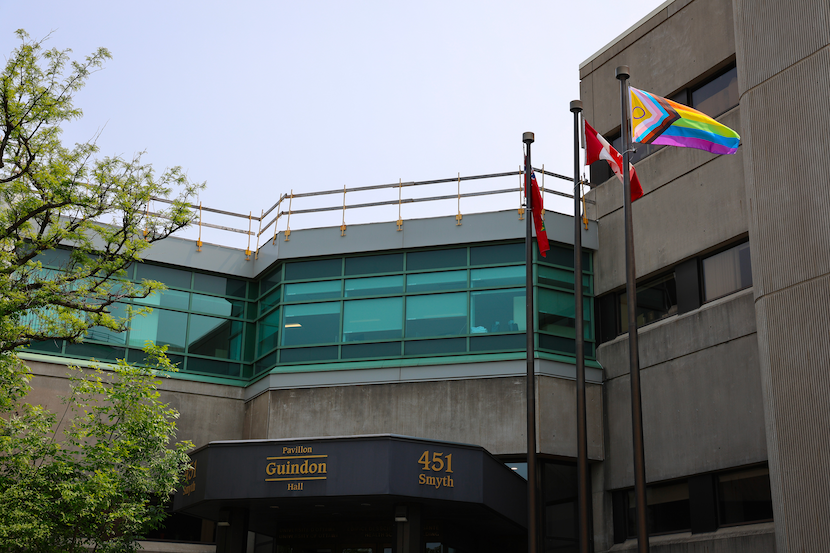As a medical student at the University of Ottawa Faculty of Medicine, Samuel Streicher is combining his identity and academic training to uniquely contribute to patient care and clinical ethics.
For Streicher, MD 2027, pride and self-authenticity aren’t just personal, but also professional—guiding the way he learns, the kind of medical care he aspires to offer, and the systems he’s working to change.
“Pride and self-authenticity bolster one’s ability to positively contribute,” Streicher says.

“Pride and self-authenticity bolster one’s ability to positively contribute.”
Samuel Streicher, MD2027
— On applying his identity to his medical pursuits
Ethics as action
Prior to beginning medical school, Streicher completed a degree in bioethics at the University of Rochester, graduating summa cum laude. Alongside his studies in bioethics, Streicher also completed minors in biology and in gender, sexuality, and women’s studies.
Leveraging the intersection of these fields, Streicher’s undergraduate research explored how treatment refusal rights are not always equally accessible, emphasizing unjust differences in patient care at end of life.
“My research focused on the exercise of treatment refusal rights by disabled and female patients,” he says. “My supervisor and I underscored the state’s interest in preserving life—a widely referenced US legal concept—as a potential source of ableism, and we offered recommendations for judicial improvement.”
This work gave him the opportunity to combine bioethics, health policy, and his interest in medicine in order to advocate for vulnerable patient demographics.
“I hope to contribute to health policy change along my medical journey,” he says.
At uOttawa, Streicher continues his study of ethics. To further his learning, he shaped his own opportunity by way of a tailored pre-clerkship elective, working alongside ethicists at The Ottawa Hospital (TOH) and Dr. Saumil Dholakia, physician, bioethicist, and assistant professor at the Faculty of Medicine.
Dr. Dholakia says an integral part of the ethics education mandate of both the Faculty and TOH is establishing a growth-oriented teaching–learning environment at the intersection of medical humanities, bioethics and health care.
“Samuel’s dedication to gain and apply acquired knowledge at this intersection in a real-world context helped create this much-needed elective for medical students,” he explains.
“The elective allows me to discuss consults in real time with TOH ethicists, and when possible, participate in patient-facing consults,” agrees Streicher. He hopes this elective will bolster his ability to channel his previous work into a more clinical context, and even inspire other students to do similar for themselves.
“Through his efforts, Samuel is contributing his unique blend of collaboration and health advocacy skills to addressing systemic disparities within the health care system,” says Dr. Dholakia.

Tools for queer self-advocacy
Streicher is also applying his ethics expertise to develop practical tools for gender-diverse patients navigating access to gender-affirming care.
“I’m currently working with the Canadian Queer Medical Students Association (CQMSA), specifically with McMaster MD student Jack Lawrence, to co-create a series of infographics aimed at providing gender-diverse patients with the most salient bioethical justifications for their transition-related rights,” he says.
The infographics will accompany a CQMSA initiative that catalogs gender-affirming care by province. But Streicher saw the need for something more: support for those forced to explain or defend their identities.
“These resources are intended to help queer individuals self-advocate when responding to transphobic or charged claims,” he explains.
“I reasoned that many gender-diverse individuals seeking transition support would naturally face difficult discussions with their family members and care providers,” Streicher continues. “These queer individuals might find themselves in a position of forced self-advocacy, where they are called to explain why their care is appropriate and important.”
The eight planned posters each respond to frequently raised concerns regarding gender-affirming care. Streicher notes, for example, that many people will fairly point out the risk of regret associated with gender-affirming care.
“One of our posters provides readers with insight on the relatively low risk of regret, alongside concise moral arguments to illustrate how age-appropriate gender-affirming care can be medically indicated, even if some risks exist,” he says.

Safety through authenticity
While still exploring specialties like neurology, gastroenterology, and palliative care, Streicher feels especially drawn to endocrinology—the study of the body’s hormone systems.
“Endocrinology and its intersection with gender-affirming care might be a fantastic fit for me,” he says. “It’s because of the contributions of trans people—especially trans people of colour—to the queer community that I can live so openly and freely as a gay man today. Being able to contribute to the well-being of the trans community would be an especially meaningful career path.”
His long-term goal is to integrate ethics consultation into his clinical work. “My ultimate career ambition would be to combine clinical practice with applied ethics, serving as an in-hospital ethicist while also caring for patients as a specialist,” he says.
Whatever the field, his vision remains the same: to create space for honesty, authenticity, and trust.
He says it is crucial to foster an environment where people feel safe being their true selves, a lesson he learned watching RuPaul’s Drag Race, a popular television show featuring drag artists from around the world.
“RuPaul frequently says that drag reveals who you are rather than concealing who you are. And I agree,” Streicher explains.
“By showcasing people who are unafraid to explore their queerness, the show encourages others to feel comfortable in their own skin—and this isn’t limited to queerness,” he says. “The show celebrates the traits and quirks that make each contestant unique. And I think people are most equipped to contribute to the well-being of others when they feel happy in their own skin, when they feel safe to authentically embrace their entire self.”
The same is true when it comes to medical care, Streicher explains.
“Addressing sensitive yet important issues—such as sexual health, mental health, and gender identity—requires that patients feel comfortable in their own skin,” he says. “That begins with the creation of safe, welcoming spaces.”
Support the Faculty of Medicine today!
Use the 'Other designation' field on our online donation form and indicate your support towards the 'Medical Student Scholarship Endowment Fund'.
